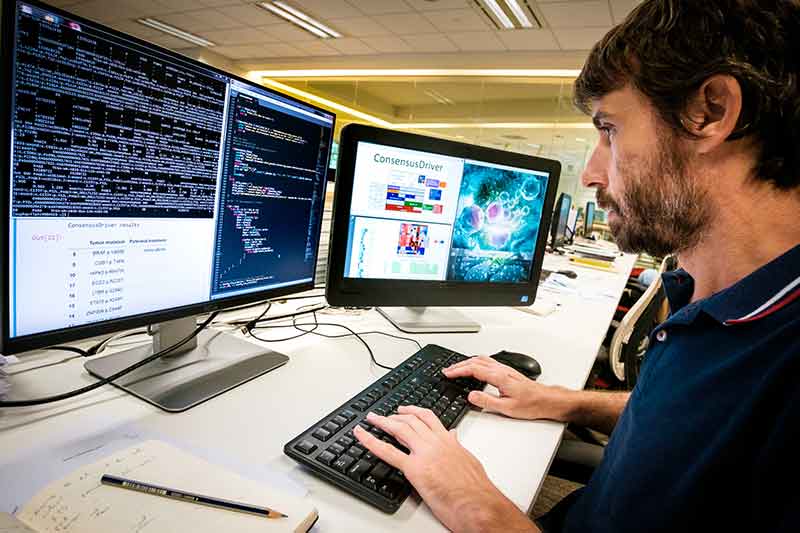
Scientists from Singapore’s Agency for Science, Technology and Research (A*STAR)’s Genome Institute of Singapore (GIS), the National Cancer Centre Singapore (NCCS) and the National University of Singapore (NUS), have developed a consensus algorithm which integrates information from many different computer programmes for accurate prediction for treatment targets in individual cancers. The outcome was a significant improvement over the performance of any single algorithm.
The work, recently published in Cancer Research, was jointly led by Dr Denis Bertrand and Professor Niranjan Nagarajan from A*STAR’s GIS.
The press release explains that breakthroughs in DNA sequencing technologies have allowed researchers to determine the complete genetic makeup of cancers. Now the challenge is to analyse the massive datasets to understand the unique genetic basis of an individual’s disease. Cancer cells have thousands of genetic lesions but only a few of these mutations give rise to a tumour. Identifying the ‘driver’ mutations that promote the uncontrolled growth of cancer cells in the body is a key challenge for precision oncology.
Researchers around the world and in Singapore are now working to develop new computer algorithms, and participating in large collaborative projects such as The Cancer Genome Atlas (TGCA) to unlock the mysteries of different cancers. (TGCA is a collaboration between the US-based National Cancer Institute (NCI) and the National Human Genome Research Institute (NHGRI) that has generated comprehensive, multi-dimensional maps of the key genomic changes in 33 types of cancer. The TCGA dataset, comprising more than two petabytes of genomic data, has been made publicly available. This genomic information helps the cancer research community to improve the prevention, diagnosis, and treatment of cancer.)
The Singapore researchers analysed data from more than 3,000 tumours, across 15 different cancer types including colon, breast, lung, stomach and liver cancer and studied 18 different existing algorithms. The scientists found that each algorithm on its own could not identify driver mutations in a significant proportion of patients. Furthermore, no single method was able to identify treatable drivers in more than 60 percent of patients.
But they noted that the methods had very different strengths. By combining them, the new system, known as ConsensusDriver, was able to identify treatment targets in nearly all patients studied, 80 percent of whom could be treated with existing drugs.

Dr Denis Bertrand, Staff Scientist at GIS and lead author of this work said, “Developing ConsensusDriver and working with The Cancer Genome Atlas has been an eye-opening experience. This is collaborative science on an international scale and we are making rapid advances in being able to give the right drug to the right patient at the right time.”
Professor Nagarajan, Associate Director and Senior Group Leader at GIS, noted, “It is remarkable that computer algorithms have become a new weapon in the battle against cancer. Instead of clubbing cancer cells with drugs indiscriminately, we are now trying to computationally pinpoint genetic weaknesses to target them with drugs more precisely.”
GIS Executive Director, Professor Ng Huck Hui, said, “The complexity of cancer genetics is one of the biggest challenges that we face in treating it. By precisely identifying actionable mutations, and tailoring treatments to individuals, we are moving a step closer to precision medicine. I am delighted to note the ongoing development of new algorithms and technologies by GIS scientists to achieve this vision.”
















